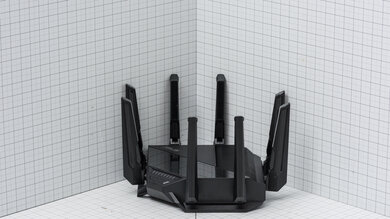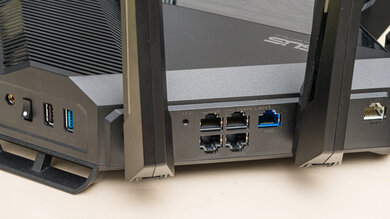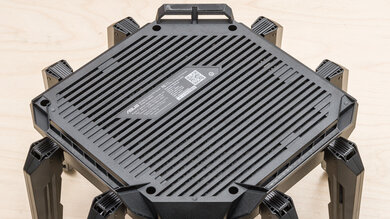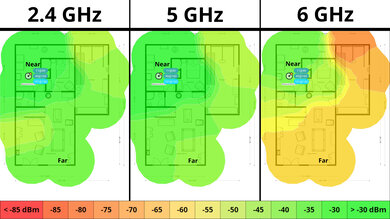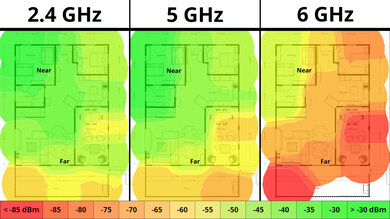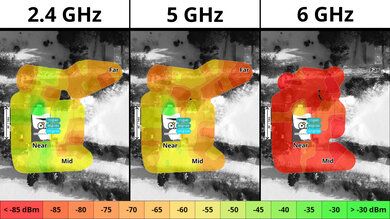The ASUS RT-BE96U is a tri-band Wi-Fi 7 router with 2.4, 5, and 6GHz bands. It has configurable dual 10Gbps network ports and a full suite of software features, like ASUS's AiMesh, which allows you to use old ASUS routers as additional access points, WPA3 security, parental controls, and more.
Our Verdict
The ASUS RT-BE96U is very good for use in an apartment or condo. Its indoor network coverage across the same floor is remarkable, delivering incredible speeds whether you're right next to the router or on the other side of your apartment. It has ample connectivity with support for 10Gbps speeds and five LAN ports. Its biggest downside is its size. It has eight large antennas and a very large footprint, so it'll stick out and be hard to conceal in a living space.
- Remarkable top speeds.
- Great wired networking connectivity with flexible port assignments.
- Wi-Fi 7 support.
- Very big and bulky.
The ASUS RT-BE96U is an impressive router for medium to large houses with multiple floors. It provides very fast speeds, whether you're right next to it, two floors above it, or in the backyard. It has great connectivity options with multiple 10Gbps network ports and five LAN ports. It's very big and has eight large antennas, so it'll stick out if installed in a living space, and its range isn't quite as far as a mesh solution.
- Remarkable top speeds.
- Great wired networking connectivity with flexible port assignments.
- Very good range.
- Wi-Fi 7 support.
- Compatible with ASUS' AiMesh for better range.
- Very big and bulky.
- 5GHz slows down at very far distances.
The ASUS RT-BE96U has remarkable top speeds suitable for a multi-gigabit internet connection. It also supports DFS (Dynamic Frequency Selection), so it can use less congested DFS-only channels to give you better speeds in noisy wireless environments.
- Remarkable top speeds.
- Wi-Fi 7 support.
The ASUS RT-BE96U has very good range. Even from nearly 100 feet away, the 6GHz band delivers superb speeds. The 5GHz range isn't as good as a mesh solution, but it's compatible with other ASUS AiMesh routers to create a mesh network.
- Very good range.
- Wi-Fi 7 support.
- Compatible with ASUS' AiMesh for better range.
- 5GHz slows down at very far distances.
Changelog
- Updated Dec 16, 2025: We've added an MLO Implementation test for Test Bench 0.8.2! Read the changelog for more details.
-
Updated Nov 06, 2025:
We've added a link to the TP-Link Archer BE900 in the Wi-Fi specifications section of the review.
- Updated May 01, 2025: We've converted this review to Test Bench 0.8.1. This includes a new test result for our Test Configuration box.
-
Updated Feb 20, 2025:
We've added the ASUS ROG RAPTURE GT-BE98 Pro as an alternative with a better network port selection in the Network Ports section.
Check Price
Differences Between Sizes And Variants
This router has no variants. Here's a photo of our unit's label.
Popular Router Comparisons
The ASUS BE96U is among the first Wi-Fi 7 routers on the market and ASUS' flagship router at the time of writing. Its configurability and number of features and settings make it stand out from other routers like the eero Max 7. It's no slouch performance-wise, delivering extremely fast top speeds and multi-gigabit networking capabilities. That said, it's still only a standalone router, and the eero Max 7 has much better range thanks to its mesh design. The ASUS is also very large for a router, and its aggressive styling might not appeal to everyone.
If you're looking for more options, check out our recommendations for the best Wi-Fi routers, the best routers for large homes, and the best long-range Wi-Fi routers.
The ASUS ROG Rapture GT-BE98 Pro and the ASUS RT-BE96U are excellent Wi-Fi 7 routers. The main difference comes down to features for mesh networking. Get the GT-BE98 Pro if you have a large home and want to set up a mesh network, as it's a quad-band router with two 6GHz bands; you can use one of the 6GHz bands as a dedicated backhaul channel that ASUS claims delivers more consistent performance. If you don't need this feature, get the RT-BE96U, as it provides similar performance and offers a better value.
The ASUS RT-BE96U is a better router than the NETGEAR Nighthawk RS300. They're both Wi-Fi 7 capable, but the ASUS is faster, has better range and more wired networking ports, and supports AiMesh for mesh expandability. The NETGEAR is physically smaller, however.
The ASUS RT-BE96U and the TP-Link Archer BE700 are high-end Wi-Fi 7 routers. Both are great options for most home sizes, but excel in slightly different areas. The ASUS delivers significantly higher top speeds at close range, but its range on the 5GHz band isn't as good as that of the TP-Link. It's also massive, and its aesthetic isn't for everyone. The TP-Link has fewer 2.5Gbps ports than the ASUS.
Test Results

This router has two multi-gigabit networking ports, both rated for 10Gbps. By default, one is a WAN port (to connect to your modem), while the other is a LAN port. You can use the router's web interface to configure the ports to your liking.
If you're looking for a router with PoE (Power over Ethernet) ports, check out the UniFi Dream Router. If you want a router with more high bandwidth network ports, check out the ASUS ROG Rapture GT-BE98 Pro.
This is a standalone router without mesh capabilities, so the mesh satellite position line on this graph isn't applicable.
If you're looking for a Wi-Fi 7 mesh option with better range, check out the TP-Link Deco BE63 or TP-Link Deco BE65 Pro.
This is a standalone router without mesh capabilities, so the mesh satellite position line on this graph isn't applicable.
Wi-Fi 7 has faster speeds, lower latency, and supports more simultaneous connections than previous generations of Wi-Fi. However, you'll need devices supporting Wi-Fi 7 to benefit from these features.
Check out the TP-Link Archer BE900 if you're interested in a quad-band Wi-Fi 7 router.

